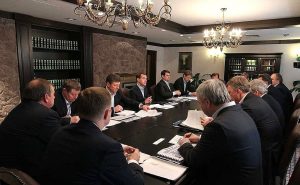Meeting’s a Bore? Not Anymore!
The strategic importance of a meeting may seem like a myth nowadays, especially if the ones you’ve experienced at your work place haven’t been all that meaningful for you. Employees and coworkers alike display an expression of resignation when a meeting is announced, and as months pass by, it becomes a part of the daily tedium.
This is not an isolated phenomenon. There is a reason why meetings are becoming shorter, more agile. Also, with work routines becoming more and more hectic. The rise of other, more influential formats of interaction is also another indicator of this change.
So where do our good old fashioned meetings stand?
Well, I can’t speak for other industries, but in the hospitality industry, meetings are crucial to establishing inter and intra-departmental communication, and one of the most important ways to get things done in a hotel. Given the perishability of products that the hospitality industry possesses (you cannot stock up on rooms ‘today’ to sell them ‘tomorrow’ or a restaurant cover for that matter), seamless communication is absolutely important.
The stress on face-to-face meetings still remains dominant, and they’re preferred to the cursory phone call or even a video conference. Your employees are ultimately human and in-person interaction is the best way to prevent information from slipping through the cracks.
A UCLA study produced interesting findings in favor of face-to-face interactions: 93 percent of communication effectiveness is determined by nonverbal cues. Yet another study indicated that the impact of a performance was determined 7 percent by the words used, 38 percent by voice quality, and 55 percent by nonverbal communication.
This brings us to two conclusions:
- The importance of meetings in the hospitality sector is high.
- It may not always be the wisest choice to communicate using distant technology.
A short examination of the meetings that occur in a hotel is necessary here.
The Morning Briefing & Other Meetings
While there are several meetings that might occur in a hotel during a typical day, one of the most dreaded, yet needed, ones is the morning briefing. While it is challenging enough for small operations to communicate effectively, the problem becomes more obvious in a hotel of considerable size and repute – given that all elements and departments have to function smoothly for a satisfactory day.

Since there’s so much going on at all times, the morning briefing is supposed to serve as an anchor and a reality check. The status of things as they stand now and a recap of what happened yesterday serve to fuel the actions of today. The subject matter of these meetings can range from briefings to do with expected arrivals, departures, guest requests, pickups, bills on hold, room revenue and so on – the list can be endless.
The mistake generally occurs when there is zero innovation in the way these meetings are carried out. A common complaint is that these meetings have no life whatsoever. Employees describe the whole affair as an exercise in fault finding, an excuse to be criticized rather than encouraged and motivated to do their job. Some meetings are just vague or lack direction, others are lengthy with no effective information being communicated whatsoever.
Ideally, meetings should have clear, tangible objectives. The meeting space and environment should be such that team members from all departments are able to communicate with one another freely. An absolute must is the time frame – it should be defined and reasonable, with everyone being on the same page when the meeting finally ends.
Other meetings aren’t exempted from these criteria – be it the Heads of Departments’ meetings once a week, departmental meetings like the food and beverages meeting, the front office meeting, the sales meeting, the credit committee meeting, the safety and security meeting, the energy conservation meeting, the idea exchange meeting, the social media meeting, and so on. The only variables here are the time and the frequency of these meetings.
Let’s take a look at what can be done to use meetings to one’s advantage in the hotel. In effect, how does one conduct effective, powerful, impact-oriented meetings that:
- Keep the employees on their toes
- Motivate them to attend further meetings?
Meetings Re-done the Right Way
- Preparation
If you are a masterful orator with a brilliant memory, then preparation may not be much of a concern, but then again, you’re probably an exception, and not all managers can boast of this quality. For this reason, it’s important to prepare in advance.
Keeping your team equipped with the information they need for the meeting beforehand can save precious minutes. Not only will everyone be on the same page, you also won’t have to repeat yourself or start from scratch. It also encourages feedback and helps employees voice their doubts in a proactive manner.
This step also involves setting the objective of your meeting beforehand and having an agenda to follow. This will help you realize your objective in a systematic way. Facts and other straightforward information should already be shared so that the meeting covers all its bases from the word go and doesn’t veer off course trying to clarify basic points.
- Time-Management
Depending on the kind of meeting you undertake, time-management will be varied – but ultimately necessary. The daily briefing in particular, with its tenacity to exceed the 15-minute mark, needs special attention. The key questions that attendees need to answer must be streamlined.
For me, the most important aspects to cover in these meetings are as follows:
- What was achieved since the last meeting?
- What are your current objectives?
- Are there any obstacles or issues that might prevent you from achieving the goals for the day?
If these questions can be answered and resolved within a minute, they should be included in the morning briefing, otherwise, they need to be attended to separately. The effective scheduling of meetings is a skill that comes only with practice.
For every achievement, take the time to include a small word of appreciation, as it tends to go a long way. Meetings needn’t be all about finding problems; they can also celebrate solutions. Reward motivation, celebrate innovation, and laude any effort an employee may have made towards ensuring employee satisfaction.
- Leaders and One-on-One Communication
All meetings need someone to streamline them, and that someone is the chair, or the leader. The leader ideally should be an excellent communicator and someone that employees look up to for guidance. What is even more ideal is the leader’s capability to innovate and break the mold when it comes to the regular meeting. He should be able to add energy and drive to motivate employees by having a thorough knowledge of the concern at hand.
Leaders and other communicators can also engage their employees in one-on-one meetings in order to strengthen relationships with them ensure that all departments are on the same page. Doing so is especially important because some employees may not feel comfortable voicing their opinions in larger groups of people. You may be missing out on valuable feedback if you don’t make the effort to reach out to them separately.
- Conduct and Conclusion
During the meeting, listening to employees in order is very important. Those with little experience should speak first and other heavyweights in the department may take over later. It’s also important to coax the more reserved employees to speak up, but this should be done in a way that doesn’t put too much pressure on them. One should also encourage healthy debate and discussion – but make sure things don’t devolve into arguments or situations where only strong speakers dominate.
You can be an exhaustive note-taker or otherwise, but keeping a succinct record of what happened in a meeting is also necessary. Given the sheer number of departments that meet and greet, it’s better to note things down rather than leave them in the air. Not only is this good practice in general, it also prevents miscommunication and false information from spoiling the rapport within departments.
Lastly, remember that the service industry hinges on proper communication. Meetings are a form of this communication that cannot be avoided, so conducting them in the most effective way is only going to be an advantage. Hence, take the time to evaluate what goes into these meetings and work them in your favor to run a successful venture in the business of hospitality.
Ram Gupta, the author is a hotel management graduate from India and Germany; He is a certified Hotel Administrator from U.S. and MIH from U.K. He has over 40 years of sound experience in the Hospitality, real estate industry in India, Dubai, U.K, Europe and Japan and is well versed with all areas of business including acquisitions, mergers, joint ventures, diversification, strategic planning, development and operations. He has been associated with over two dozen luxury and boutique hotel projects and has launched two hotel chains in India. He is currently an independent hotel consultant and could be contacted at ramgupta@bcgglobal.com. Website: www.bcgglobal.com


